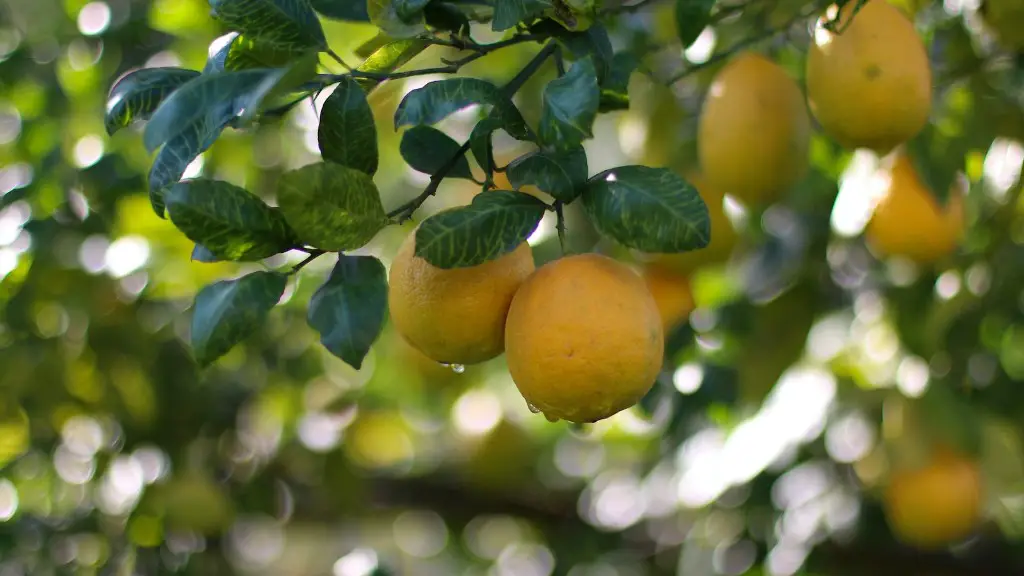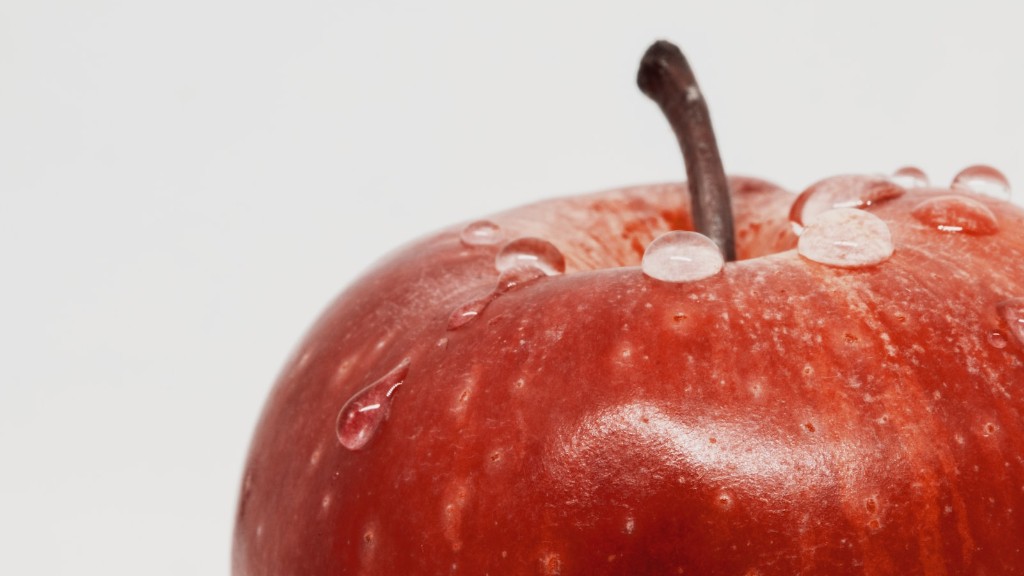Lemons are an essential part of many diets: they are tart, they’re versatile and they bring a zest to cooking that can’t be beat. Lemons don’t just produce delicious fruit – they can also be grown in a garden and can become quite large trees. Knowing how big your lemon tree can grow is important for both the novice and experienced gardener alike.
Firstly, it’s important to know what type of lemon tree you have – both the type of lemon fruit and the type of tree. The lemon tree itself can range in size from a dwarf variety, which reaches up to 6 feet tall, to a standard, full-grown tree that can get up to 20 feet in height and width. Depending on tree variety and location, a lemon tree can get up to twice that size.
The amount of growth your lemon tree displays is also highly dependent on the environment: warmer climates tend to encourage growers to allow their lemon trees to become large and full, while varieties planted in cold climates may not get as big owing to limiting environmental factors.
Caring for a large lemon tree requires regular attention. Prune the tree regularly to ensure optimal growth, and make sure the tree is getting adequate sunlight and water during the right parts of the year. For a larger tree, an appropriate fertilizer routine is also key for keeping the tree healthy and producing juicy fruit.
Maintaining optimal care of a lemon tree is particularly important in the winter, when the amount of natural sunlight is more limited. Make sure to prune regularly and provide the necessary nutrients and warmth to keep the tree healthy when it is most vulnerable to environmental conditions and illnesses.
Finally, you may be wondering what kind of harvest you can expect when planting and caring for a larger lemon tree. Dwarf varieties may produce up to 70 lemons each season, a medium-sized tree can produce hundreds of lemons, and a large, full-grown tree may yield an astonishing 4,000 to 5,000 lemons annually!
Fertilizing a Lemon Tree
Fertilizing your lemon tree is one of the most important steps in ensuring a bountiful, healthy lemon harvest each year. Regular application of a balanced fertilizer at the start of the spring season is a great way to ensure all parts of your tree get access to the nutrients they need for healthy growth.
It’s important to use the right fertilizer for your lemon tree – a balanced 8-8-8 NPK fertilizer or a citrus-specific fertilizer is best. Too much of one nutrient can leave your lemon tree vulnerable to environmental changes or illnesses: use the right fertilizer in the right amounts to promote the best growth of your lemon tree.
In addition to an initial application at the start of spring, many lemon trees will also benefit from regular fertilizer applications throughout the growing season. Monthly applications during the spring and summer seasons can ensure that the tree can take advantage of the warmer weather and grow without nutrient deficiencies.
For those living in climates with wintertime temperatures lower than the ideal temperature range for lemon trees, a wintertime application of fertilizer can be beneficial for trees too. This will help the trees stay healthy and resilient against any cold spells or periods of dormancy.
Overall, proper fertilizing of your lemon tree is another key component to healthy growth: a balanced fertilizer schedule is a great way to ensure that your lemon tree can take advantage of the warm weather and produce a delicious, abundant harvest each season!
Harvesting and Storing Lemons
Once the time comes to bring in the harvest, it’s important to know the best way to use and store your lemon bounty. First, be sure to pick the lemons when they are ripe: too underripe and they will not be as flavorful or sour, and too ripe they risk rotting on the tree or falling off and going to waste.
When picking, be sure to handle your lemons with care as they are delicate and can bruise. The best way to store your lemons is in a cool dry place away from direct sunlight. Your lemons can last for up to a month in the refrigerator and even longer if kept in a cool dry spot out of the sun.
Lemons can also be preserved for later use through freezing or canning. Freezing is a great way to store longer-term, as it can help preserve the flavor and texture of the lemon for up to six months. Canning is an even greater way of preserving your lemon bounty: it can last for up to two years, and is a great way to make a tasty conserve or marmalade that can be enjoyed over a longer period of time.
It’s also important to remember that unripe or partially ripe lemons can also be used: they provide a great source of pectin which can be used as a thickener in sauces, jams, and other recipes. Not every lemon needs to be eaten right away, so make sure to make the most of your harvest!
Disease Prevention of a Lemon Tree
A large lemon tree can be a beautiful addition to any garden, but caring for such a large tree can become overwhelming. Planting in the correct place, providing the necessary care, and making sure the environment is ideal for the tree is all important parts of ensuring a healthy, vibrant plant throughout its life.
But beyond just making sure the environment is ideal for your lemon tree, it’s also important to be aware of the different types of pests and diseases that can affect lemon trees. From root rot caused by overwatering to citrus greening disease, there are many risks to watch out for.
So what preventative measures can a lemon tree grower take? Regular inspections of the tree, particularly of the leaves, trunk, and fruit, is crucial. Inspect the tree at least once a week and look for any signs of discoloration or wilting leaves that can indicate a pest or disease infestation.
It’s also important to make sure that you are correctly pruning and disposing of diseased branches or leaves so as to not reintroduce a disease back into the tree after it has been treated. If a disease has been identified, research proper treatment methods so as to protect the wider tree from damage or infestation. Also make sure to provide adequate sunlight and air circulation as these can aid in keeping insects and disease away.
Providing the Correct Amount of Water
Providing your lemon tree with the proper amount of water is essential for optimal growth and health. Too much water can cause the tree to become prone to root rot and other illnesses, while too little water can lead to drooping and wilting leaves. Therefore, it’s important to make sure that the tree is getting the right amount of water at the right time.
For larger lemon trees, make sure to water at least once a week, more so during the summer months as the hot weather can lead to faster evaporation. Early morning is the best time of day to water a lemon tree, as this will give the tree plenty of time to absorb the water into its roots before the hottest part of the day.
Also, be sure to apply watering slowly and thoroughly, from the base of the tree all the way out to the tips of the branches. Doing this will help to ensure that the tree has the best opportunity to absorb the water properly and in a balanced way.
If in doubt, don’t just water your tree – feel the soil with your hand and determine if the tree truly needs water. Soil that is dry all the way through is a sign that the tree needs water, while slightly damp soil indicates that your tree is adequately hydrated.
Pest Control of a Lemon Tree
As with any other type of tree or plant, lemon trees can fall victim to pest infestations, particularly if the environment is not ideal or if regular maintenance and inspections are neglected. Therefore, it’s important to inspect your lemon tree regularly for signs of pests and to know what to do in the event that you discover a pest infestation.
For starters, spotting pests early and removing them physically is an effective method of pest control. Willow branches with sticky sap can also be placed near the branches of the tree to trap crawling insects that may be trying to feed, such as aphids.
For more serious infestations, natural insecticides such as neem oil and paraffin oil can be effective in killing pests, although it is important to follow label directions when using these products. Insecticides such as pyrethrin can also be applied to infestations, with the added bonus that they can also kill beneficial insects such as pollinators.
Finally, insecticidal soap works as an effective preventative measure against infestations. Applying this soap once a week will reduce the likeliness of pests taking up residence in your lemon tree, as it is an effective method of killing off pests that have either already made it to the tree or are in danger of doing so.



